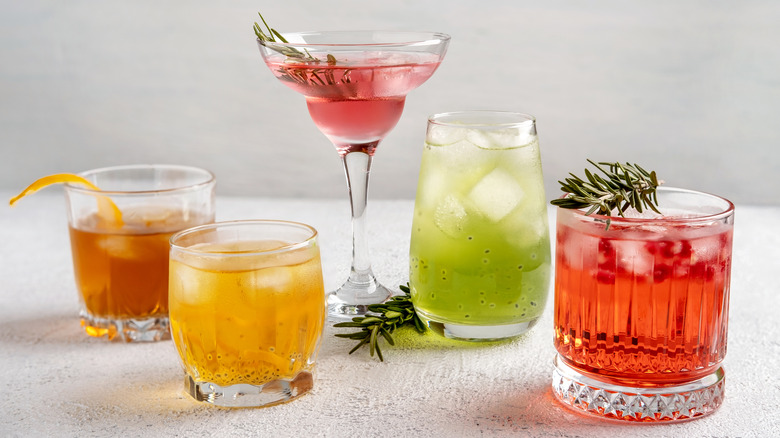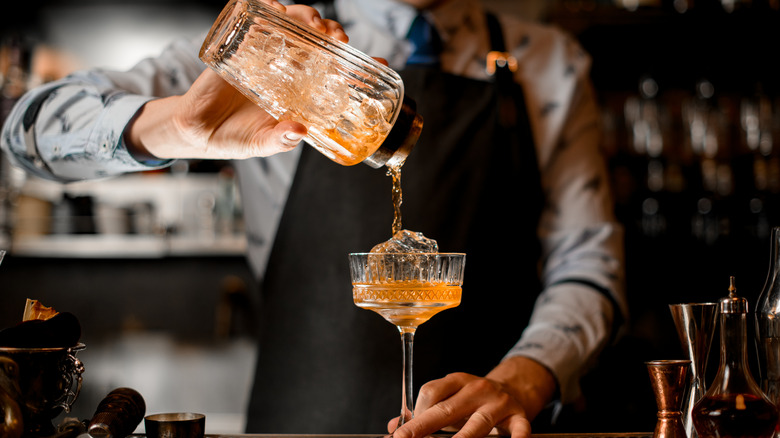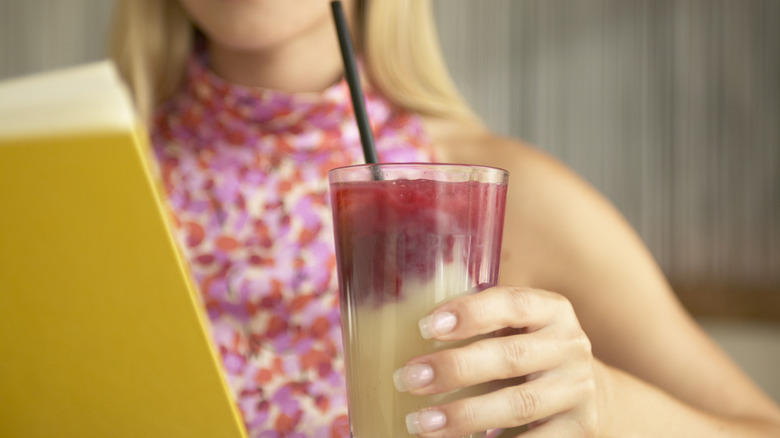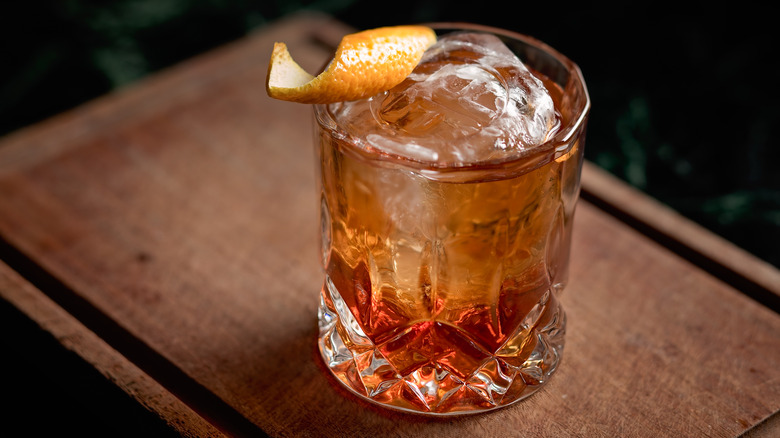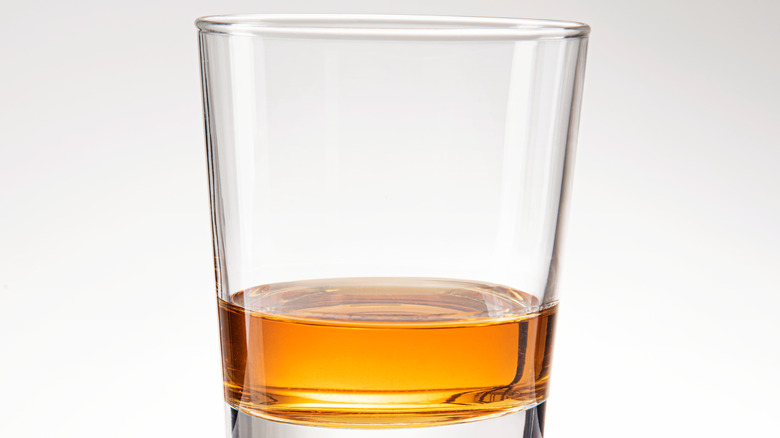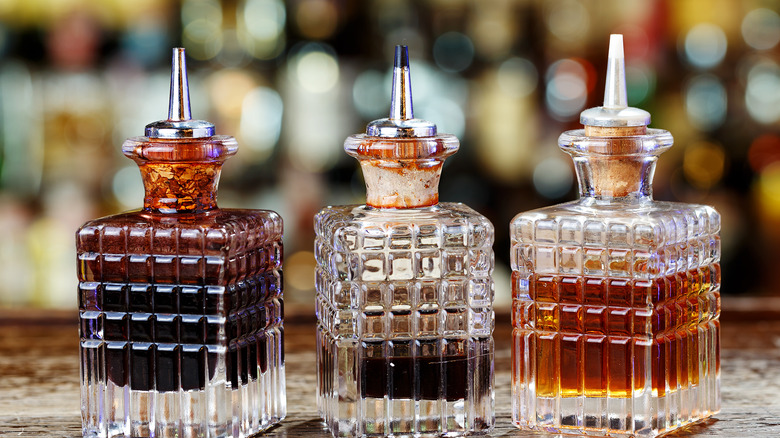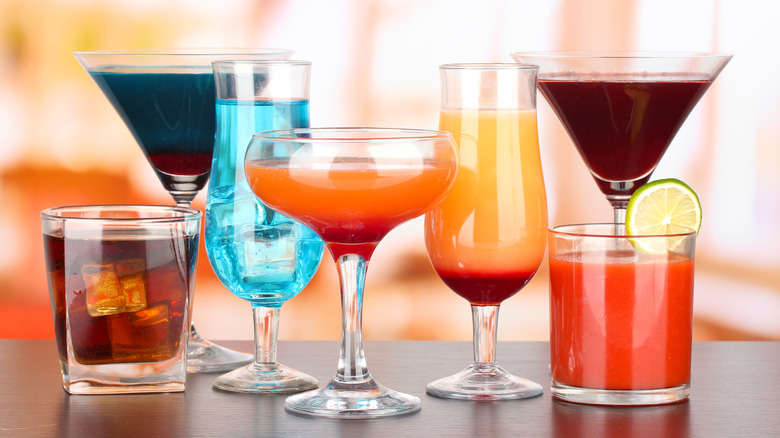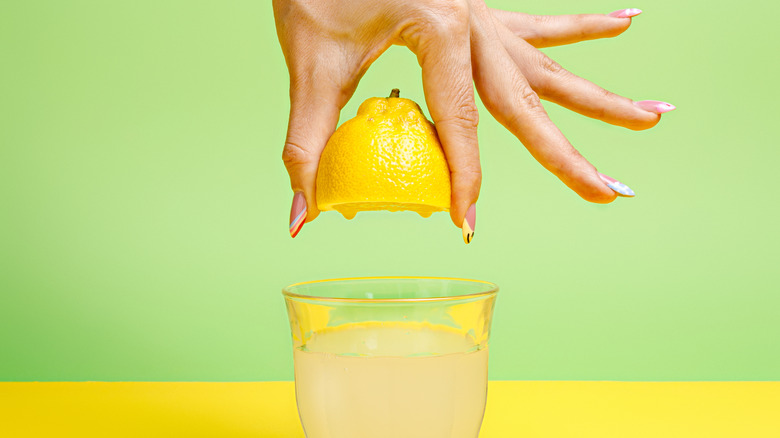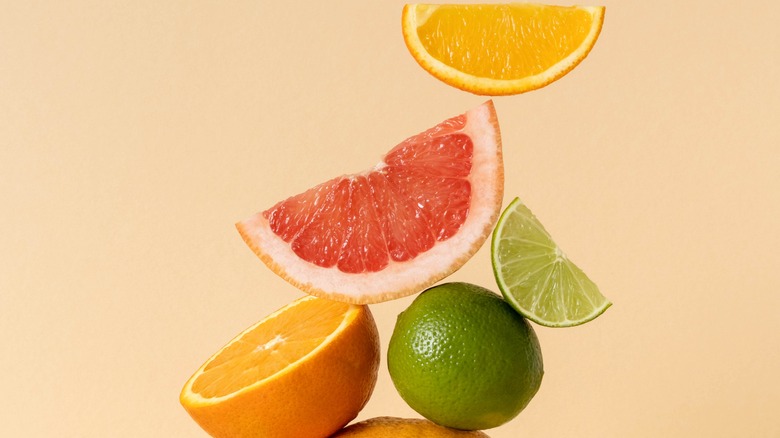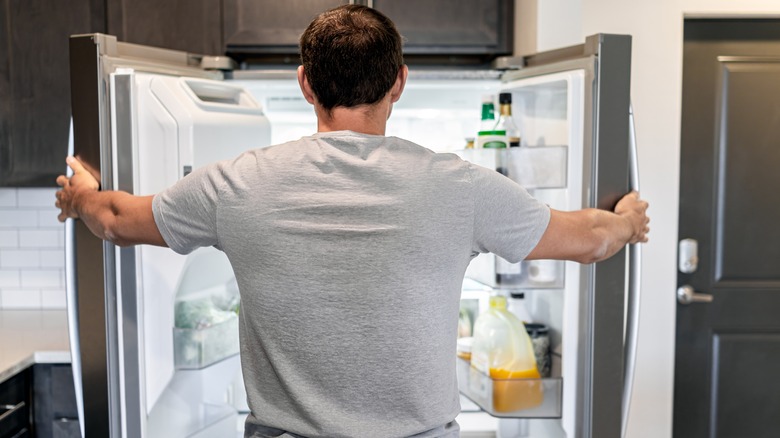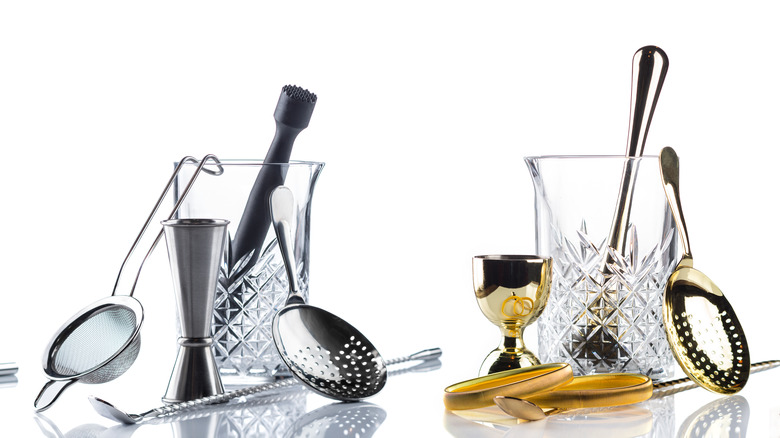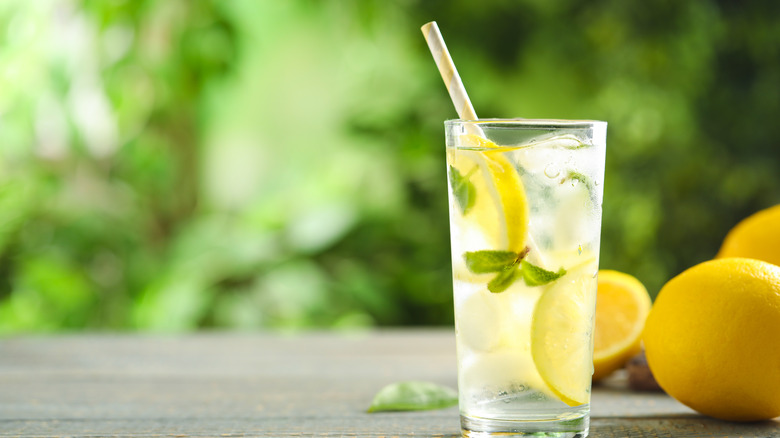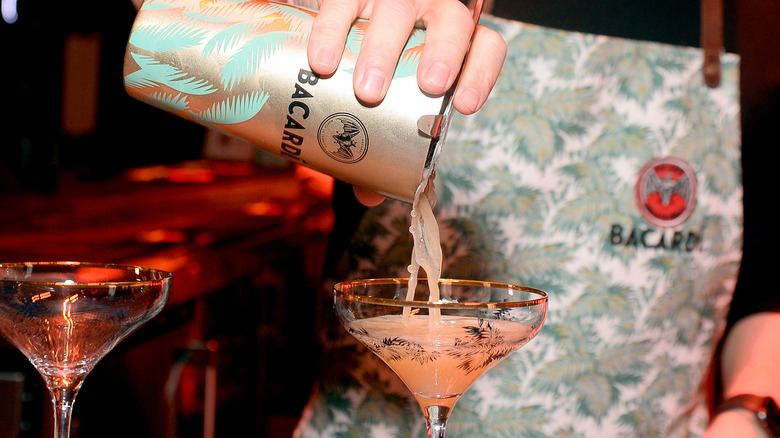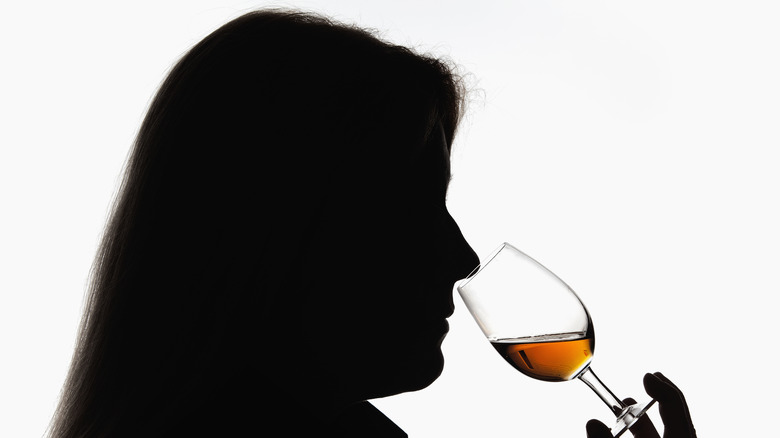15 Bartender's Tips For Creating Your Own Cocktails
Creating your own cocktails is a fun and delicious way to get your creative juices flowing — literally. However, many people are intimidated by the idea of shaking (or stirring) up their own concoctions without the help of a recipe. As difficult as the bartender at your favorite fancy speakeasy may make it seem, we're here to tell you that you don't need to toss shakers in the air, infuse rare liquors with exotic ingredients, or light anything on fire to make a quaffable creation.
Having your own signature recipe on hand can be a lifesaver the next time you have guests over or you need to bring something impressive to a party. Thankfully, with some basic knowledge, a few helpful tips, and of course, the willingness to act as your own taste tester (it's a tough job, but someone has to do it), you'll have everything you need to start creating your own cocktails.
Visit cocktail bars
While it's possible to learn about cocktails at home, doing so is infinitely more difficult than learning the basics at a reputable drinking establishment. Whether you're a full-blown cocktail nerd or you don't know the difference between a tequila sunrise and a tequila soda, there are always lessons to be learned at a cocktail bar.
Ordering drinks at a bar will not only introduce you to essential flavor combinations, classic cocktails, and specialty beverages, but doing so will also allow you to experience the subtle details that separate good drinks from exceptional ones. For example, you might already know that you should garnish an Old Fashioned with an orange peel, but seeing a professional bartender smoke the peel before expressing it over the drink can serve as inspiration for the next time you want to experiment at home.
Plus, cocktail bars usually stock a wide selection of spirits, so you can order a drink that contains a liquor you're unfamiliar with before committing to buying an entire bottle at the liquor store. You can think of patronizing a cocktail bar as the equivalent of attending a "Drinking 101" class — so be ready to pay attention!
Do your reading
Let's keep the school analogy going: If visiting a cocktail bar is like "Drinking 101," picking up a few cocktail books can be considered required reading. Just like cookbooks provide useful instruction and appetite-inducing inspiration, cocktail books will provide you with the practical knowledge you need to start making your own drinks.
Now, you might be wondering how reading about other people's drink creations can help you forge your own path, but trust us — understanding the basic concepts behind successful cocktails is a great place to start. Plus, there are books that cover everything from how spirits are distilled, to the history behind big brands, to the best vintage cocktails, to the science of combining scents and flavors. The more knowledge you have regarding the basic building blocks of beverages, the more successful you'll be when it's time to transform them into something delicious.
Your proverbial reading list can also include the wealth of articles, podcasts, and even social media accounts that are dedicated to the art and science of making drinks.
Start with classic cocktails
When you're learning to cook, it's best to start with simple items and work your way up to more complicated dishes. The same concept applies when it comes to making cocktails. Before you dive into uncharted territory creating your own unique libations, it's a good idea to master a few classic recipes first.
Most specialty drinks are riffs on classics, so learning the original recipes will give you a solid foundation to which you can add your own special touches and pizazz. For example, if your ultimate goal is to create a one-of-a-kind, tequila-based cocktail, you need to start by mastering a perfectly balanced margarita. If you want to craft something that's boozy, bitter, and spirit-forward, you need to understand the ratios in a Negroni.
Once you understand the basic templates for classic cocktails, you'll start to notice that most specialty drinks at bars are based on these tried-and-true recipes. Recognizing those patterns will help make the idea of creating your own cocktail less daunting.
Sample spirits on their own
No matter how many ingredients you want your cocktail to include, more often than not, the booze is the star of the show — which means you need to understand the flavor of various types of alcohol before you start conceptualizing your drink. The only way to understand the flavors in different spirits is by tasting them, so even if you don't normally enjoy drinking liquor on its own, you still need to take a small sip to see what you're working with.
This is not the time to close your eyes and throw back a shot, but rather an opportunity to smell, swirl, sip, and contemplate the tasting notes in your glass (just like you'd do if you were tasting wine). If you're just starting out, it can be helpful to research the bottle first in order to get an idea of the flavors and aromas you should be noticing.
Understanding how potential base spirits taste on their own can inform your decisions regarding which other ingredients to feature. For example, if you have a bottle of gin in your liquor cabinet that's bright and citrusy, you may want to consider emphasizing those notes by adding freshly squeezed lemon juice, a citrus-forward tonic, or orange bitters.
Learn about essential ingredients
Once you have a handle on the spirits you plan to use in your creations, you can move on to learning about other cocktail-making essentials. While pretty much anything edible can be used as an ingredient in a tasty, out-of-the-box drink (pickle juice whiskey sour, anyone?), there are a few staples to which you should pay close attention — and probably keep stocked in your fridge or on your bar cart.
Bitters, vermouths, liqueurs, aperitifs, and amari are all great ingredients to familiarize yourself with before you start developing cocktails. If you don't know the difference between sweet and dry vermouth, you're going to have a hard time nailing a cocktail that contains either one. If you're not privy to the incredible difference an appropriate dash of bitters can make in a drink, your cocktail may end up tasting flat. Once again, it's important to have a solid foundation of knowledge to help you start getting creative.
Choose your base
If the only thing you're sure of is that you want to create a cocktail, we applaud you for your open-minded intentions. However, we're also here to tell you that if you're a beginner, your concept is probably too vague. If you're open to including any type of spirit you can find in the liquor aisle (along with every ingredient, mixer, and add-in you can find at the grocery store), decision fatigue is likely to take hold and thwart your creative process.
To avoid going into a cocktail-related panic, we recommend selecting your base spirit (and sticking with it) before you do anything else. It's a lot easier to decide you want to make a whiskey-based drink and then base your other ingredients around the flavor profile of whiskey than it is to think about the plethora of other directions in which you could take your beverage.
Choosing a base spirit before you do anything else allows you to put helpful parameters in place that will make the entire process easier. Sometimes, having fewer options is the better option.
Determine the general direction
Once you've decided on your base, you should think about the general direction in which you want to take your drink. Asking yourself a few basic questions is a good place to start.
Do you want to your drink to be spirit-forward or refreshing? Is your goal to make a cocktail that's sweet and easy-drinking or bitter and complex? Do you plan to serve your cocktail in coupe glass or in a rocks glass over ice?
Answering these questions will help you make other important drink-making decisions. For example, if you know you want to make something spirit-forward, you'll probably end up making a stirred drink. On the other hand, if you want to make something that's perfect for sipping on the porch on a hot summer day, you'll likely end up making a drink that's shaken and contains citrus juice. It's also a good idea to think back to cocktails you've enjoyed in the past to help you map out the blueprint for your beverage.
Focus on simple flavors
It's easy to go overboard when you're creating your own cocktail. After all, the sky is the limit when it comes to combining flavors and experimenting with unique ingredients. As tempting as it can be to keep adding ingredient after ingredient to your cocktail shaker, keeping things simple is often the way to go.
This piece of advice rings especially true if you're new to making drinks. Even a few drops of a clashing ingredient can completely de-rail your cocktail, so it's best to limit yourself to just a few flavors. Resist the urge to go crazy, and think about flavor combinations that work outside the context of a drink.
Another thing to keep in mind is that some of the world's most popular cocktails only feature a few ingredients, which goes to show that less can be more when you're using high-quality juices, syrups, and of course, liquor.
Be aware of balance
If you think the secret to a delicious cocktail is using the most expensive, premium spirits or the most unique ingredients, think again. The real key to making a drink work is focusing on balance above all else. Most beverages contain elements of sweetness, acidity, alcohol, and even water — and well-made beverages don't let any of these elements overwhelm the others.
Take a classic daiquiri, for example. Daiquiris only contain three simple ingredients (rum, lime juice, and simple syrup), but since those ingredients balance each other out — and it's shaken over ice to add some essential dilution — the end result tastes anything but basic.
So, if you plan to add a hefty dose of mouth-puckering citrus juice to your cocktail, be sure to balance it out with something sugary. If your drink is built on a sweet base like spiced rum, don't be too heavy-handed on the other sweet ingredients.
Be resourceful with what you've got
Although being strategic and methodical about crafting your cocktail is great in theory, it's not always possible in practice — and that can be a good thing. Sometimes necessity is the mother of invention, so having to use your resources can result in a tasty creation. If you have a bottle of juice in the fridge or a unique bottle of liqueur on your bar cart, you can always start with the ingredients you already have on hand and go from there.
You'll be surprised at how easy it is to turn just a few staples into something delicious when you put your mind to it (and you've done the cocktail-related homework we suggested above). Whether you find yourself stuck at home in a snowstorm and want to whip up a cozy snow day libation, or you're in a small town where your only grocery store option is a gas station, you never know when being able to make a drink in a pinch is going to come in handy. When you find yourself needing to get resourceful, the best course of action is just to have fun. That's usually the point of drinking, after all!
Use the right tools
There's a reason why professional bartenders all use tools like tin shakers, jiggers, strainers, and bar spoons to make drinks: doing so results in better cocktails. No matter how much thought you put into your recipe, how carefully you select your ingredients, or how much time you've spent conducting research, your cocktail isn't going to turn how like you hope if you don't have the right tools.
Luckily, you don't need anything too fancy or complicated, and there are cocktail tools for every type of home bar on the market. Basic tools aside, we also recommend investing in a citrus juicer (a hand-held one will work just fine), large ice cube molds (if you like spirit-forward drinks), and a muddler.
Of course, if you find yourself making cocktails on a camping trip or at a picnic, there's really no wrong way to get the job done. Sometimes re-purposing a takeout cup as a mixing vessel is the best you can do, and that's okay.
Consider the season
Nature can serve as useful inspiration for your cocktail-making endeavors. Looking to the seasons to help inform the direction in which you take your beverage is helpful in terms of ensuring your drink is as enjoyable as possible, as well as ensuring your ingredients are at their peaks.
If you find yourself with "bartender's block," one of the best strategies is to consider adding fruits, veggies, herbs, and spices that align with the season to your cocktail. There's nothing like a fruity, refreshing drink that's bursting with fresh berries in the summer, just like nothing beats a warming, spiced cocktail that features winter fruit like cranberry and orange in the winter.
The seasons can inform more than just the ingredients you opt to use in your creations. Winter drinks tend to be more spirit-forward, so they're often stirred, while summer drinks usually call for a good shake as they tend to feature bright notes of citrus and other juices.
Make several rounds
The only way to find out if your cocktail tastes good is to make it. It's important to remember that you might not nail your recipe on the first try, so stay open-minded, positive, and ready to make adjustments as needed.
Even if you have to throw out the first batch or two, experimenting will pay off when you have a delicious cocktail you can proudly call your own. Even if you enjoy your cocktail the first time around, making a few minor adjustments can take it from good to great. Most of the time, imperfect cocktails are still drinkable, so this research project can double as happy hour.
Be sure to have enough ingredients on hand to whip up a few rounds, since it's incredibly frustrating to get into the drink-making groove only to find that you've run out of a key element of your drink. Plus, if you've been acting as your own taste tester, you shouldn't be driving to the store to pick up additional ingredients, so planning truly is key.
Ask for opinions
If you've made a few versions of your cocktail and still find that something isn't right, but you can't quite pinpoint what it is, the best course of action is usually to get an outside opinion. Employing the help of an objective third party can help you determine what your drink is missing (or in some cases, what it contains too much of).
When bartenders create new drinks, they usually seek the opinions of their co-workers, managers, and bar guests before officially putting them on the menu. Sometimes, they even adjust the specs of a drink after it's gone live based on customer feedback, so there's no shame in asking for a little help.
Some people's palates are more sensitive to certain flavors than others, so it can take an outside opinion to let you know that your drink contains too much acidity, too little sweetness, or not enough complexity. Trust us, it's usually pretty easy to find people to fill the position of cocktail critic. Just be sure you let your helpers know that you want honest feedback and remember that sometimes making a cocktail takes a village.
Write your recipes down
If you make a great cocktail, you'll want to be able to return to it in the future — so don't forget to write down your recipes. Writing down what works will also give you a wealth of knowledge upon which you can base future creations. Even if you feel confident that you'll be able to remember everything down to the quarter ounce, please just trust us on this one. In a few days, weeks, or whenever you want to re-create your concoction, you are not going to remember how much simple syrup you used.
Hopefully, when you make a round of your signature cocktail for your friends and family, they'll love it so much they'll ask you for the recipe, too. If you want to take this tip one step further, you can consider starting a dedicated cocktail journal. Keeping all your recipes, notes, and ideas in the same place will help you stay organized.
